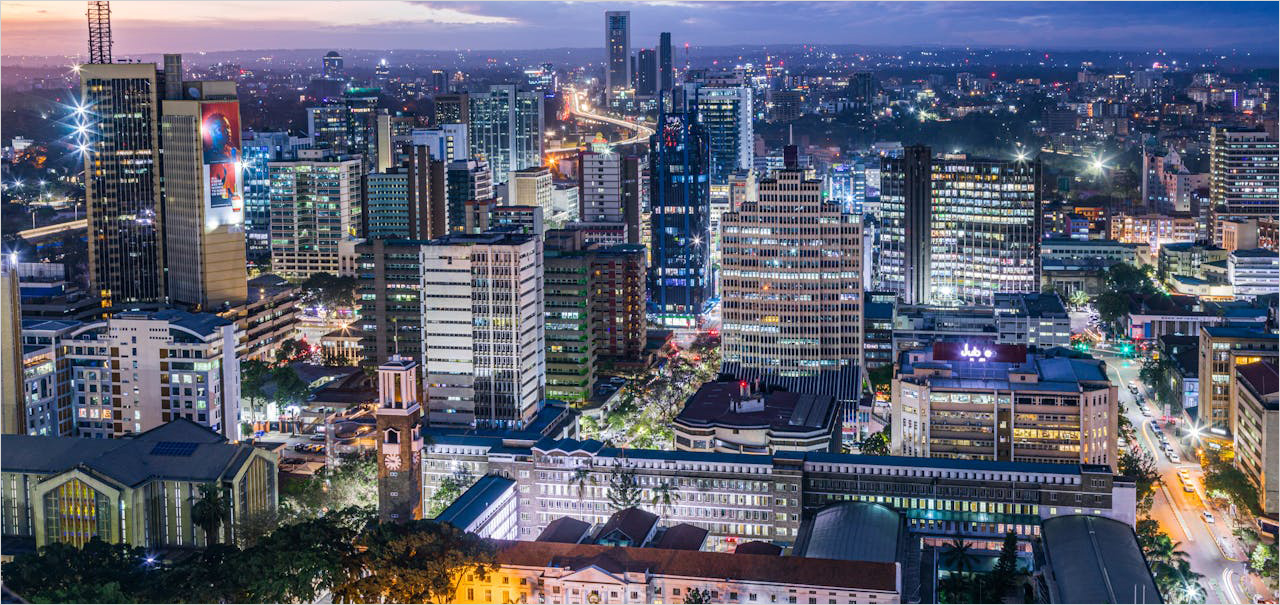

Kenya is a country in East Africa with coastline on the Indian Ocean. It encompasses savannah, lakelands, the dramatic Great Rift Valley and mountain highlands. It's also home to wildlife like lions, elephants and rhinos. From Nairobi, the capital, safaris visit the Maasai Mara Reserve, known for its annual wildebeest migrations, and Amboseli National Park, offering views of Tanzania's 5,895m Mt. Kilimanjaro.
Capital: Nairobi
Currency: Kenyan Shilling
Official languages: Swahili, English
Dialing code: +254
Gross domestic product: 1107,440.60 Million USD (World Bank)
Population: 55.1 Million (World Bank)
Kenya has a domestic market of over 50 million people and is the fourth largest economy in sub-Saharan Africa. It is the gateway to the East African market and is the economic, commercial, ICT, financial, and logistics hub of the region. Kenya has a young, educated, entrepreneurial, and English-speaking population possessing high fluency in technology. Kenya enjoys strong relationships and business access with many major African countries. Kenya has built strong bilateral and multilateral trade relationships and is a member of the East African Community (EAC), the Common Market for Eastern and Southern Africa (COMESA), and the Africa Continental Free Trade Area (AfCFTA)
Area: 224,900 square miles
Kenya has good infrastructure and connectivity ranging from huge ports, railways, highways and airports. Kenya has a road transportation system classified as International Trunk Roads, National Trunk Roads, Primary Roads, etc. Construction of many new highways have also been undertaken.
Total length: 160,878 km
Paved: 11,189 km
Unpaved: 149,689 km
Air Connectivity
Kenya is a regional leader in air transportation. The success of Kenya’s airline, a top carrier in the region, is largely due to an innovative public private partnership with KLM, and its international airports have grown into a key gateway to Africa. Beyond its role as an international hub, Kenya has a domestic air transport market that is among the top 5 in Sub-Saharan Africa.
Major Airports
-Jomo Kenyatta International Airport, is Kenya’s largest aviation facility, and the busiest airport in East Africa.
-Moi International Airport, Mombasa.
-Apart from these, there are more than 30 other smaller civil airports in Kenya.
Kenya’s literacy rate stands at about 80%. Nairobi has many excellent International schools which impart education in English medium. Most of the International schools follow the academic system similar to the British national curriculum. Some International Schools of Kenya follow the American pattern. Kenya’s university education system continues to evolve. Accredited universities include 23 public universities, 10 public constituent colleges, 17 private chartered universities, 5 private university constituent colleges and 14 institutions with letter of interim authority. E-learning and other forms of open and distance learning have also increased. Kenya prides itself in its large pool of highly educated, skilled, English speaking and sought after work force in Africa.
Nairobi: It is the capital and largest city of Kenya and with thousands of Kenyan businesses and over 100 major international companies and organizations, Nairobi is an established hub for business and culture. With a population of about 3.4 million, Nairobi is the second-largest city by population in the African Great Lakes region after Dar es Salaam, Tanzania. Konza Techno City, located 64 km south of Nairobi, has been envisaged as the Technology park of Kenya, and is set to host mainly IT and Business Process Outsourcing (BPO) ventures. The project is estimated to cost approx. US$14.5bn.
Mombasa: It is a coastal city and Kenya’s second-largest city with a population of about 1.2 million. Mombasa has Kilindini Harbour - the largest port of Kenya and an international airport. It is an important regional tourism centre. The major intercontinental undersea telecom cables hits shores next to Mombasa, connecting the African Great Lakes to the rest of the world and supporting a fast-growing call centre business in the area.
Kisumu: It is the third largest city in Kenya, and the principal city of western Kenya. Being a port city along the Lake Victoria basin, it also serves as an inland terminal. The Kisumu region has approximately 1.6 million hectares of agricultural land.
Nakuru: Nakuru, with more than 300 thousand inhabitants is the fourth largest city of Kenya and the capital of Nakuru County in Kenya. Small Scale Agriculture, manufacturing and tourism form the backbone of the economy of Nakuru.
Expogroup is a full service exhibition organiser with over 29 years experience in International Trade Exhibitions and Events. Our current portfolio includes 25 annual exhibitions from a diverse range of industries being held across the Middle East & Africa.
EXPOGROUP © 1996 - 2026 | Privacy policyJoin our mailing list and receive latest news and advice from us in our monthly Newsletter
Yes, I would like to recieve Expogroup E-newsletters